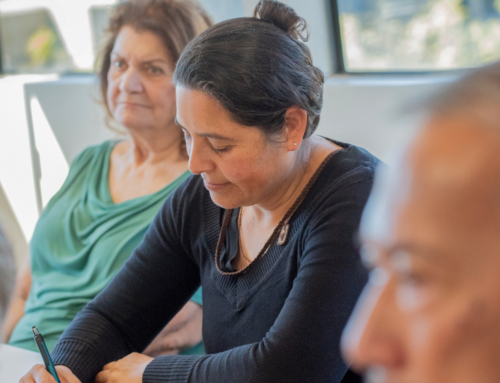
Clinical Care Coach Corner: Written by Nelly Gonzalez, MA
The holidays are meant to be focused on being thankful, celebrating traditions, and honoring faith- related traditions. Now, the focus is often on hosting dinners, gifting presents, or traveling to reunions. All of these can be time-consuming, overwhelming, and stressful. A stress-relieving practice that research has shown positively impacts psychological health is practicing mindfulness, especially during the holidays.
Originally derived from Buddhist practice, mindfulness has been slightly re-interpreted in the Western world and is a self-care practice commonly defined as becoming aware of yourself (thoughts, body parts and sensations) and your surroundings in the moment, in a non-judgmental manner or without reacting (adapted from APA Dictionary of Psychology). Over the last couple of decades, it’s been a topic of interest and is commonly associated with meditation practices. However, you can practice mindfulness for about 5 minutes every day as a tool to help in relieving stress by grounding you in the moment.
Steps for Practicing Mindfulness
Starting the process: Our brain is constantly thinking about what we did yesterday or planning for what tomorrow will look like. Try using your senses to help you in bringing awareness to the moment.
Sight: Observe colors, shapes, placement of items, and appearance. The trick here is to look without judging, so avoid thinking if that item is out of place or needs to be fixed. Simply notice it like checking off a list of things to notice in your surroundings. Maybe as you sit during a holiday dinner, look around at others next to you and try to take in everyone’s appearance, the food that’s being enjoyed, and the decorations placed around the room. If looking around is too stimulating, you can focus on an item that feels pleasant to look at.
Touch: Use your hands, feet, legs, arms, or other body parts to feel the outside world. Perhaps as you are washing dishes, notice the water flowing on your skin and the feel of soap on your hands. Massage body parts that get tense, like your shoulders, neck, feet, or legs. If you hug someone, notice the tightness of the hug or the feel of clothes, all without thinking of it as good or bad.
Sound: What sounds are around you in that moment? Our brains are used to ignoring sounds that can be distracting. For our current purpose, bring awareness to the sounds around you such as music, voices, laughter, running water, cutting vegetables, a ticking clock or the quiet around us.
Smell: This one can be more difficult in terms of not being judgmental, especially if there’s an unpleasant smell surrounding us. The best way to start with this one is focusing on smell when there’s a pleasant smell from fresh laundry, your favorite meal, coffee in the morning, fresh outdoor air, or your favorite candle.
Taste: Flavor can also be unpleasant. So, try this one as you are enjoying a meal by noticing the flavors and texture of the food. Imagine you are trying to decipher the ingredients that are in the meal.
What’s next?
Once you can focus on the moment by using your senses, try other self-care strategies. Here are a couple of activities that mix well with the concepts of mindfulness.
Breathing: Use your sense of smell as an aid and visualize the air entering and leaving your lungs.
Something new: Try doing something new or very different from what you are used to. This can be a new family tradition, or it can be a new hobby you try out. Try to bring attention to the moment through your sense of sight, touch, and sound to enhance the activity.
Overall, the main idea is to stop and “smell the roses”. Know that this is one of many techniques, so if practicing mindfulness is not for you, read some of our other blogs like “Self Care Tips for Care Partners” for alternative stress-relieving techniques. My hope is that you can take some time for yourself to focus on self-care, in whichever way that looks like.
Our “Clinical Care Coach Corner” series is where our team of dementia experts weigh in on unique topics and provide insight that can help people impacted by dementia.
RECOMMENDED: Holiday Tips for Dementia Caregivers





